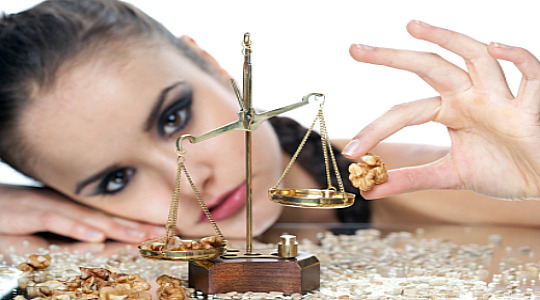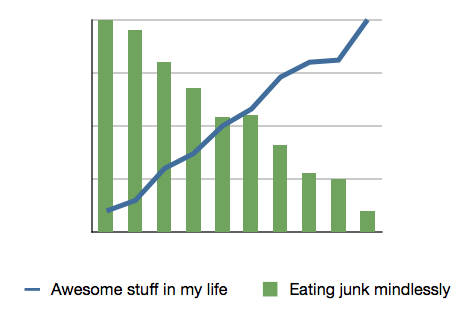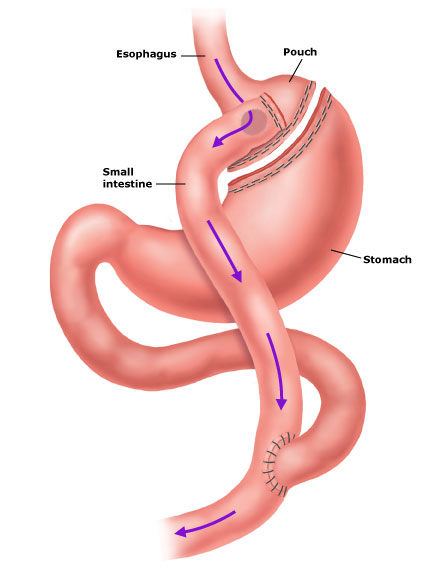If you’re happy and you know it… you probably won’t eat a super-sized bag of chips.
Here’s an inverse relationship that holds true for many people:
When life stimulation is up, junk food consumption is down.
When life stimulation is down, junk food consumption is up.
Have you noticed this?
When we have a thriving and challenging career, engaging relationships, exciting hobbies, plenty of physical activity, adequate time outdoors, volunteer activities, and so on – that’s life stimulation.
When we don’t have these types of activities occurring in life — our job is boring, family is bumming us out, and we don’t have anything to get excited about — we can escape with junk food.
If we turn to food for stimulation once in a while, it’s probably not a big deal. But using food for continual stimulation describes daily living for some people. And it’s the non-nutritious stuff creating stimulation – not broccoli or lentils.
Okay – but it goes deeper
So you’ve thought about the life stimulation/overeating thing. Great. But the really fascinating thing is what happens next. What happens after you realize that you’re eating lots of junk food as a response to life’s stressors or challenges.
For most people, when they realize the they’re eating lots of non-nutritious food, eating in response to head hunger, lacking life stimulation, feeling horrible, and getting unhealthy/gaining fat — what do they do? They usually begin to focus more on the food (or exercise).

They diet, they count calories, they weigh food, they read more about nutrition, and so on. (Some of them even run on the treadmill to burn calories). But in reality, in most of the cases, is this:
The problem isn’t food. The problem is life.
They lack those engaging daily activities and relationships. Those are the things that feed us in another way. When we fill ourselves up with life stimulation, we don’t try to fill up on junk food instead.
It’s like someone with depression taking a mood elevating medication without getting to the root of the problem. While the med might help them temporarily feel a little better, in the long-term the problem will persist unless it’s addressed.
From our clients
Have you ever been on a really stimulating or unique vacation? Or do you remember starting a new year at school or career? What about the first few dates with someone you really like? You likely forgot about food – except for when you were actually hungry. It’s classic stimulation. When we are stimulated with new things, new people, and new places, we don’t resort to repeated pantry visits.

Before I open my case of Tarot cards and predict your future, here is some feedback direct from PN clients:
“Food can be a quick fix for any emotion. I struggle with this. Outside of morphine to dull my emotions, I’ve found the only thing that consistently works is exercise.”
“In society, our self-worth is often tied to our physical appearance. Take someone who eats for emotional reasons because they are dissatisfied with life. Well, if they become even more dissatisfied with life because of their physical appearance, they’ll eat more and the cycle continues. Getting out of that is extremely difficult. Some of us have (for the most part) and others can’t see the end.”
“Even though I never track my physical activity or food intake during ‘busy’ times, like going on a trip, I always seem to lose weight during those times, no matter what I’m eating. I think it’s because I’m in a new space and excited about being there, just living in the moment.”
“I think the hardest part is admitting to yourself that your current lifestyle is not stimulating enough, especially when it involves a job that you may be bored with. Many people look for diversions (e.g., TV, entertainment, food, drinking). It’s one thing to ‘count our blessings’ and remind ourselves that it could always be worse, but I think we need to go beyond that to truly feel stimulated each day.”
Gastric bypass lessons
I’ve seen this type of situation on repeated occasions with clients who undergo gastric bypass. They undergo a life-altering surgical procedure and they’re compliant with the new lifestyle for a few months. But by the time 1 year post-op rolls around, they are starting to gain weight again.
Why?
Because food was never the problem. Life was. The life problems just manifested themselves via eating. If this is the case, the individual will end up turning to food again, no matter how small their stomach is.

Surprise: it’s your life, not your diet
I’ll leave you with this. I remember chatting with a Lean Eating Coaching client after 3 months of working together. She was discouraged and not making progress.
One weekend I asked her to think about why she was eating junk food when it didn’t match up with her values/goals. She came back with a very insightful response. She told me that she was eating junk food each day at work because she hated her job. She found it boring and tedious. She was just trying to get through the day. To do that, she relied on stimulation from junk food (and soda). That was her pleasure for the day: candy, snacks and soda.
Whoa. That’s big stuff. Going on a diet plan isn’t gonna do much for that. So ask yourself:
If you struggle with eating, have you figured out the true root of the problem?
Does junk food consumption automatically go down in proportion to how stimulated/satisfied you are with your life?

Learn more
Want to get in the best shape of your life, and stay that way for good? Check out the following 5-day body transformation courses.
The best part? They're totally free.
To check out the free courses, just click one of the links below.



Share